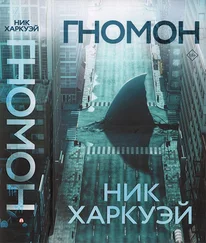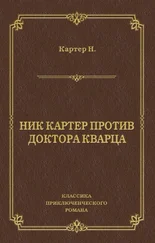The technique is called Mokume-gane . He laughs, suddenly, loudly, and it echoes through the enclosed space. Of course. If one were to do this with gold and iron, and then immerse the result in nitric acid, the iron would dissolve. A truly subtle metalworker—a genius—might fold the metal in leaf-thin layers, an origami so carefully executed that the resulting mesh of gold would flex like cloth, would appear to have been woven.
He takes the washed steel rod and quenches it, then—obedient to the requirements of the instruction manual—fits it and cools it again in place. There is a brief, high sound, like a chime as it settles into the mechanism. He hesitates.
“Try.”
The Lovelace growls again, and this time whines as well, and the engine—decoupled, for the moment, from its massive load—shifts slightly on the track.
All night and much of the day he has worked like that, and he is not tired. It is as if twenty years of sleep and certainty have stored themselves up in him for discharge in a time of need. The Lovelace is ready.
Polly Cradle catches him around the neck and drags him up into the driver’s cab. On the floor of the engine she makes love to him, skin slick with transferred grime.
“ Aglœc-wif ,” he murmurs afterwards, and she isn’t sure whether he means her or the train. Together, they wait for the beginning: the night of misrule.
It is known, among coppers and criminals alike, that society can be policed only because it consents. When the burden of law or government is too great, or too oppressive, or when economic need or famine breaks the normal course of life, there simply are not—can never be—enough coppers to hold the line. Thus, if a man wishes to commit a crime which by its nature must excite the immediate response of every policeman within twenty miles, his first precaution should be to await a volcano or a popular revolution, so that these diligent officers have other things on their minds.
On the other hand, if criminals were ever sufficiently organised as to commit a hundred major crimes on one night, or better yet, a thousand, the vast majority of them must get away scot-free. In such circumstances, a particular institution not immediately recognised as vital to the survival of the state—not, in fact, Downing Street, or the House of Commons, or the Palace—would have to fight for attention, might even be sorely neglected for some hours, especially if its champions in Whitehall were themselves distracted.
Of course, criminals being by and large self-interested and mistrustful of one another, such an event is generally thought by the forces of law and order to be quite impossible.
The night is very quiet, and very cold. On the Chantry Road in London’s financial heart, the tall, imperial buildings sleep. Even the modern additions, steel and glass statement-constructs seeking to overmatch a heritage of blood, art, and conquest by sheer size, are closed up and cold. Lights burn on the upper floors, traders and analysts letting commerce take precedence over family one more time in a desperate attempt to add to a Christmas bonus they won’t have time to spend. On the street, a fox wanders to and fro, plucking at the bulging dustbins and yowling.
At midnight oh one, with a flash so bright that for a moment it is daytime in the dark, open-plan offices all around, the doors come off the Ravenscroft Savings & Commodities Bank. The explosion is so unnecessarily huge that the great steel shutters on the front of the building are also torn away, flying across the street and destroying a vintage Aston Martin. The fox is flung bodily into a sculpture garden, and makes his displeasure at this imposition widely known. Policemen hasten to the spot. Terrorism or robbery, it hardly matters: the action has a blunt defiance which must be answered.
But when they get there, there’s no one robbing the place. It’s just open.
Which is when the alarm goes up from Ridley Street and Hatton Garden and Shottmore Park, and then from Bond Street, from the Silver Vaults, from the Strand, from the secure depository at Uxbridge and the Christie’s warehouse in Bethnal Green.
London is alive with crime.
Caro Cable is cracking a safe in the British Museum.
Dizzy Spencer has her foot over the accelerator outside the Tower of London. Because why the Hell not?
Across the capital, from Dartford Creek to Staines Bridge, alarm bells ring and klaxons sound; electronic sentinels wail for assistance and police call centres are swamped. The main emergency station shunts capacity to the Dundee office, which is protocol, but someone cuts the line ten minutes later in Oxfordshire, which bounces the whole catastrophe to the emergency satellite. No one’s going to steal that!
But Big Douggie’s daughter knows a boy whose brother is a cracker—a professional computer-systems intruder—who knows someone in Sweden who does this kind of work. The satellite is now carrying Dutch pornography, in vast quantity, to the delighted sailors of a Russian factory ship in mid-Atlantic.
In Pimlico, a very old man is caught three floors up stealing undergarments from the linen cupboard of a woman who once, long ago, was a noted music-hall entertainer. She declines to press charges, and invites him to join her for tea. The attending sergeant—overstretched and rushing to a break-in at the local Lloyds Bank—nonetheless takes time to record that the chief witness has a twinkle in her eye.
The fire service withdraw their operators from the police switchboard, and ten minutes later the ambulance crews do the same. They are entitled. In the chaos, normal catastrophe continues, and they can’t be swamped by police business.
At every crime scene, the same white card, and rumours of a hatted, spatted figure in the background, like the ghost of Humphrey Bogart.
YOU HAVE BEEN
ROBBED
BY CRAZY JOE.
Across the capital, amid the broken glass, a sense of outrage blossoms: He’s taunting us! He is! The natural censoriousness of England asserts itself. He ought to be ashamed!
Many of the banks being raided are the keepers of sensitive documents, business deals not entirely honest, controversial decisions involving the treatment of indigenous peoples or the environment, or choices about cutting costs by risking customer welfare, and these, instead of being decently discarded as worthless or used in perfectly respectable blackmail, the cheeky bastard takes pains to return through the good offices of national newspapers and quite inappropriate websites, who naturally peruse them in the course of handing them over and make trouble. The outrage grows: It’s cheeky! It’s revolution!
Crazy Joe must pay. To make such a mess, at this moment, with the bees incoming, spotted over the Channel. It’s irresponsible, is what it is. Lives will be lost. Reputations will suffer.
London is awake, and afraid, and excited. Families cluster around television sets, late bars with wireless internet fill with news-hungry clients. Long-distance lorry drivers, bus drivers and cabmen in traffic jams frown and grumble and turn on talk radio, and mutter about the state of things.
It’s a complete disgrace!
Shocking.
But, on the other hand, it’s crime . Not terrorism. Not war. Not drug violence or acid throwing or honour killing or celebrities or multiple rape. Not riots. Not financial collapse. Not magic, dreadful machines in the sky or the end of the world. Good, wholesome, old-fashioned British crime.
Читать дальше
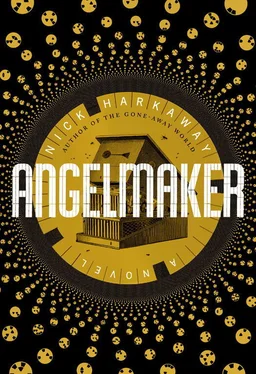


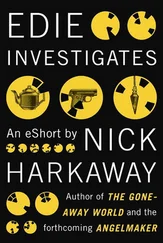
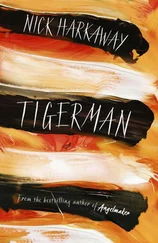
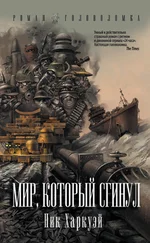



![Ник Харкуэй - Гномон [litres]](/books/400023/nik-harkuej-gnomon-litres-thumb.webp)
